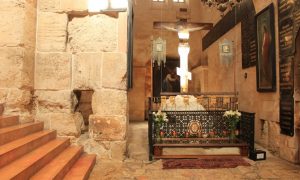“Now a certain leader asked him, ‘Good teacher, what must I do to inherit eternal life?’ Jesus said to him, ‘Why do you call me good? No one is good except God alone. You know the commandments: “Do not commit adultery, do not murder, do not steal, do not give false testimony, honor your father and mother.”’ The man replied, ‘I have wholeheartedly obeyed all these laws since my youth.’” (Luke 18:18-21)
Most people that I know want the best out of life and to have the best life possible. The man Jesus was talking with wanted this. From what we can see he was living a good life. He was a Jew, one of God’s chosen people, and he was faithfully, wholeheartedly, following God’s commands. But he was missing something. “What must I do to inherit eternal life?” he asked Jesus.
“When Jesus heard this, he said to him, ‘One thing you still lack. Sell all that you have and give the money to the poor, and you will have treasure in heaven. Then come, follow me.’ But when the man heard this he became very sad, for he was extremely wealthy.” (Luke 18:22-23)
Although the man was very wealthy, he seems to have lacked compassion in his life, especially compassion towards those who were poor. It would seem he was hoarding his wealth for himself. Jesus recognized what this man needed in order to have the life that would lead to eternal life. He needed to learn to rely on God and not on the wealth he had accumulated. The solution? Sell it all and give it to the poor, thus securing real treasure, treasure in heaven. Then follow Jesus as the Messiah.
This man became very sad because he was “extremely wealthy.” How would we feel if Jesus asked this of us? Often when we study this we are very quick to point out that he doesn’t ask this of everyone. And that is true, as we can see many in the book of Acts who sold what they had and some (like Mark’s mother Mary) who had a house and servants.
Perhaps we are often quick to justify our own wealth, to justify spending what we have on ourselves. But isn’t this the problem Jesus was addressing? The man’s problem seems to have been similar to the man in another parable Jesus told. If you remember, this man had a bumper crop and needed more storage space so he could store it all and have a good life. Too often we think only of ourselves rather than how we can use our blessings to further Jesus’ mission of seeking and saving the lost, of being a blessing to others.
“When Jesus noticed this, he said, ‘How hard it is for the rich to enter the kingdom of God! In fact, it is easier for a camel to go through the eye of a needle than for a rich person to enter the kingdom of God.’ Those who heard this said, ‘Then who can be saved?’” (Luke 18:24-26)
Those who heard what Jesus said are similar to many today. We think that if a person is successful in making money, then God must be blessing him. Jesus said the opposite: the rich will struggle to enter God’s kingdom. Why? Because wealth can cause them to trust in themselves and what they have rather than in God.
There was a gate in Jerusalem known as “the eye of the needle” which would be very difficult for a camel to get through, especially if it were loaded down. Some think this is what Jesus was referring to, but I believe it was more than this. A camel could never go through the eye of a real needle. Neither can a person who trusts in his wealth enter God’s kingdom.
Although it is easy to point our fingers at others, we need to examine ourselves. What are we doing with the blessings God has given us?
Photo by Jon Galloway: “the eye of the needle” (on left) in Alexander Nevsky Church, Jerusalem
